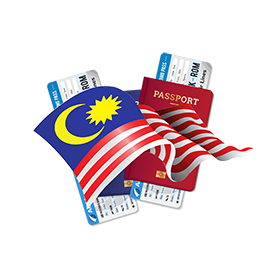Malaysia is emerging as a global hub for higher education, hosting over 170,000 international students from Asia, Europe, Africa, and the Middle East. Its advanced educational system and strategic Southeast Asian location provide opportunities for academic success in a multicultural setting. This guide highlights the benefits of studying in Malaysia, including affordability, diversity, cultural richness, and natural beauty. Want to study in Malaysia? This guide is your 1st step!
Why Choose Malaysia as Your Study Destination?
Malaysia offers an array of compelling reasons for international students to choose it as their study destination:
- Affordability: Malaysia is known for its low-cost education. Tuition fees in public universities generally range from $550 to $4,950 per academic year, significantly lower than countries like the US, Canada, UK, or Australia. Living costs are also budget-friendly.
- English Proficiency: English is widely spoken in Malaysia, easing communication for international students. Universities offer many programs taught in English.
- Prestigious Universities: Malaysian universities hold strong positions in international rankings. For example, Universiti Teknologi Malaysia (UTM) ranks 187th globally in the QS World University Rankings.
- Safe and Stable Environment: Malaysia is recognized as one of the safest countries in the world, providing a secure environment conducive to studying.
- World Heritage Sites and Natural Beauty: Explore stunning natural landscapes, historical landmarks, and vibrant cities during your studies.
- Diverse Courses and Specializations: Malaysian universities offer a wide range of programs, including world-renowned specializations in computer science, medicine, data science and engineering.
- Branches of International Universities: Reputable foreign universities, such as the University of Nottingham (UK) and Monash University (Australia), have campuses in Malaysia.
- Student Work Opportunities: International students can work part-time (up to 20 hours per week), gaining valuable work experience.

What Can You Study in Malaysia?
Malaysia’s universities offer an impressive array of programs, giving you the freedom to pursue your passions and build a strong foundation for your future career. Here’s a glimpse of the exciting fields you can study in Malaysia:
- Engineering: Delve into specializations like agricultural, architectural, petroleum, computer, civil, mechanical, and software engineering. Most Malaysian engineering programs are recognized among the world’s best.
- Medical Fields: Train to become a doctor, pharmacist, nurse, or other healthcare professional. Malaysia’s growing healthcare sector offers promising career prospects.
- Business and Economics: Gain in-demand skills in accounting, finance, marketing, management, and related disciplines.
- Languages: Master English, the language of global business, or explore other widely spoken languages like Arabic, Chinese, and Hindi. Malaysia’s multilingual environment provides a perfect setting for language learning.
- And More! Malaysia’s universities offer programs spanning many other fields, including information technology, the sciences, social sciences, the arts, and humanities.
Related:
- Studying Medicine In Malaysia For International Students
- How To Open A Student Bank Account In Malaysia (Steps)
- Schools available for Arabs in Malaysia

Understanding Admission Requirements for Malaysian Universities
Navigating the application process for Malaysian universities requires careful planning and attention to detail. To ensure a smooth and successful application, follow these guidelines:
General Admission Steps
- Choose Your University and Program: Research universities carefully, comparing their programs, strengths, costs, and locations to find the ideal fit.
- Verify Language Requirements: Each university sets its own English proficiency standards (IELTS, TOEFL, PTE Academic, etc.). Check the specific score needed for your chosen program.
- Understand Program Requirements: Know the exact prerequisites for your desired program (e.g., minimum grades, specific subjects studied).
- Gather Documents: Start preparing early. Commonly required documents include:
- High school diploma/Bachelor’s degree and transcripts (translated if necessary)
- Passport and/or birth certificate
- Updated CV
- English proficiency test results
- Proof of scholarships/financial support (if applicable)
- Letters of recommendation (if required)
- Submit Your Application Timely: Adhere strictly to deadlines. Most universities have online application portals. Pay the associated fees.
- Boost Your English Skills: If you need to improve your English, consider English language institutes in Malaysia to better prepare yourself.
- If you do not meet the requirements, a foundation programme can fix that. read all about it in our guide.
Tips for Choosing Your University In Malaysia
- Global Ranking: Factor in the university’s reputation in international rankings (e.g., QS World University Rankings).
- Program Variety: Seek universities with a strong selection of programs in your area of interest.
- Research Focus: If you are passionate about research, choose a university with active research programs and supportive facilities.
- Student Life: Consider factors beyond academics, like student clubs, support services, and the overall campus environment.
Important Note: Each university has specific requirements. Always consult the university’s official website for the most up-to-date and detailed information.
Admission Requirements and Application Process
To successfully apply for admission to Malaysian universities, follow these general steps:
- Choose Your University and Program: Explore university websites and select programs that align with your goals.
- Meet Language Requirements: Demonstrate English proficiency by taking the IELTS, TOEFL, or PTE Academic.
- Prepare Documents: Gather transcripts, passport copies, a CV, letters of recommendation (if required), and proof of financial support.
- Submit Your Application: Apply through the university’s online portal and pay any application fees.
- Apply for Scholarships (If Eligible): Research and apply for scholarships to help offset the costs of studying in Malaysia.
Note: Specific requirements may vary between universities. Always check the official website of your chosen institution for the most up-to-date information.
Cost of Studying in Malaysia
Malaysia’s affordability is a major draw. Here’s a general breakdown of expected costs:
- Tuition Fees (Public Universities):
- Undergraduate: $2750 – $4950 annually
- Postgraduate: $550 – $4400 annually
- Tuition Fees (Private Universities):
- Undergraduate: $1,480 – $10,240 annually
- Postgraduate: $1630 – $3300 annually
- Additional Costs:
- Visa: $230 (one-time)
- Study Materials: $10 – $50 per semester

Cost of Living in Malaysia
- Food: $18 – $25 per day
- Accommodation: Varies depending on location and type of housing.
- Health Insurance: Provided by the university.
- Transportation: Affordable public transportation options available.
- Utilities (Electricity, Water, Internet): Approximately $60 – $85 per month
- Mobile Phone Plan: $5 – $50 per month
Money-Saving Tips When You Study In Malaysia
Managing your finances while studying abroad can be a challenge, but it’s definitely achievable! Follow these practical tips to stretch your budget and thrive in Malaysia:
- Share Accommodation: One of the biggest expenses is housing. Splitting rent with roommates in an off-campus apartment can significantly reduce your costs.
- Become a Home Chef: Eating out frequently gets expensive. Cook more meals at home to save money. Explore Malaysia’s vibrant markets for fresh, affordable ingredients.
- Utilize University Transport: If your university provides transportation services, take advantage of them to save on commuting costs.
- Used Textbook Market: Buy used textbooks and study materials from fellow students to cut down on academic expenses.
- Student Discount Power: Never leave home without your student ID! Many stores, restaurants, and entertainment venues in Malaysia offer student discounts.
- Consider a Part-Time Job: Working part-time, especially during breaks, can boost your income. Make sure to check university guidelines and visa regulations.
Can International Students Work in Malaysia?
Yes, international students are generally permitted to work part-time in Malaysia, but keep these important points in mind:
- University Approval: Malaysian universities allow part-time work, but some have restrictions (e.g., specific industries). Always get approval from your university first.
- Work Guidance: Your university can help you understand the specific laws and procedures for working as a student.
- Visa Validity: You must maintain a valid Malaysia student visa. Work permissions will be outlined on it.
- Respect Local Laws: Familiarize yourself with all Malaysian laws regarding student employment.
Frequently Asked Questions (FAQs)
Is studying in Malaysia free?
No, studying in Malaysia is not typically free for international students. Costs include tuition, housing, living expenses, and books. However, scholarships may be available, such as those grants provided through the IESCO platform.
Do I need a visa to enter Malaysia?
Most nationalities require a student visa to study in Malaysia. Apply through a Malaysian embassy or consulate, or your chosen university may assist. Citizens of some countries may be eligible for visa-free entry.
Is Malaysia economically poor?
No, Malaysia is a middle-income country with a growing, diverse economy. It’s considered one of the emerging “Asian Tiger” economies and boasts strong industry, agriculture, tourism, and oil and gas sectors. While income inequality exists, Malaysia is not generally considered a poor country.
Is studying in Malaysia difficult?
The difficulty depends on your chosen program, language proficiency, prior preparation, and dedication. Here’s what to consider:
- Program Level: Higher levels (Master’s, Doctorate) and certain specializations are more demanding.
- Language Skills: Struggling with English can create challenges. Language courses may be necessary.
- Preparation: Good prior knowledge in your subject area makes studying easier.
- University Support: Most universities offer resources like preparatory courses and academic advising to help students succeed.

How Can I Travel To Malaysia? Steps?
Follow these steps:
- Valid Passport: Ensure your passport covers the duration of your stay.
- Visa (if required): Apply for the appropriate visa (student, tourist, etc.) based on your nationality and purpose of travel.
- Book Flights: Find a travel agency to help you book flights.
- Travel Insurance: Consider purchasing insurance for emergencies.
- Book Accommodation: Secure housing in advance (hotel, university dorm, apartment).
- Check Health Requirements: Research and comply with any vaccination or health screening requirements.
- Organize Documents: Keep your passport, visa, reservations, and other important documents safe and accessible.
Related: Main Scholarships In Malaysia
What are the disadvantages of living in Malaysia?
Living in Malaysia has many advantages, but it may come with some disadvantages and challenges for residents. Here are some of the potential disadvantages of living in Malaysia:
- Hot and humid weather: Malaysia has a tropical climate, which means it is hot and humid throughout the year. Temperatures range from 25-35 degrees Celsius with high humidity. This can be annoying for people who are not used to humid weather or who prefer a milder climate.
- Traffic congestion: Large cities like Kuala Lumpur suffer from severe traffic congestion during peak hours. Although there is a public transportation system, the congestion can make navigating the city difficult and time-consuming.
- Limited availability of public transportation in some areas: Although there is a well-developed public transportation network in major cities, rural areas and some small towns may lack adequate public transportation, making owning a car a necessity.
- Language barriers: Although English is widely used, the local language (Malay) is still widely used in daily life and government dealings, which can be a challenge for foreigners who don’t speak Malay.
These disadvantages vary in their impact from person to person depending on individual preferences and circumstances, and some can be overcome through adaptation and familiarization with local life.
Can I study in Malaysia without IELTS?
Yes, you can study in Malaysia without an IELTS certificate at many universities, as some Malaysian universities offer alternative options to demonstrate English language proficiency. Below is an explanation of the options available to study without IELTS:
- Use an English language proficiency certificate from a previous institution: Students who have previously studied at an educational institution where English was the language of instruction can submit a certificate from their previous university proving their English language proficiency as an alternative to IELTS.
- Introductory English programs: Many Malaysian universities offer introductory English language programs. If you don’t qualify or don’t score high on official language tests, you can enroll in an introductory language program and gain conditional admission into the study program of your choice.
- Universities that do not require IELTS: There are several universities in Malaysia that accept students without the need for IELTS, including Asia Pacific University of Technology and Innovation (APU), Swinburne University, Curtin University, and Segi University. These universities allow students to prove their English proficiency through internal tests or previous certificates.
- Scholarships that do not require IELTS: Some fully-funded scholarships such as the Malaysia International Scholarship (MIS) and MTCP Scholarship do not require IELTS and allow international students to study at Malaysian universities provided they provide proof of language proficiency through other means such as TOFEL.
How much does it cost to rent an apartment in Malaysia?
The cost of renting apartments in Malaysia varies depending on the location and the size of the unit. Here are some details:
One-Bedroom Apartment
- In the city center, such as Kuala Lumpur, monthly rents range from MYR 1,450 to MYR 4,000 (about USD 300 to 850), with an average of about MYR 2,365 (about USD 510).
- Outside the city center, prices are lower, ranging between MYR 1,000 and 2,500 (about 210 to 530 USD) per month.
Three-Bedroom Apartment
- In central areas, such as Kuala Lumpur, rental costs may reach 3,000 to 7,500 ringgit (about 640 to 1,600 USD).
- Outside the central areas, rents range from 2,000 to 4,500 ringgit (about 425 to 960 USD)
Is the Malaysian language difficult?
The Malaysian language is relatively easy to learn, especially for English speakers, but it does present some challenges. Here is a detailed assessment of its difficulty based on several aspects:
- Ease of letters and pronunciation: Malaysian is written in the Latin alphabet, which makes reading and writing easier for people who are fluent in the English alphabet. Pronunciation is simple and clear most of the time; words are pronounced as they are written without major complications, making it easier to learn compared to other languages such as Chinese or Japanese.
- Simple grammar: The Malaysian language is characterized by its simple grammar. There are no conjugations of verbs by tense, and nouns rarely change between singular and plural. The absence of conjugations makes it easier for learners to understand the use of verbs in sentences.
- Challenges in vocabulary and structures: Although the language uses a familiar alphabet, the vocabulary may be completely new to English-speaking learners, due to the lack of common words between the two languages. Learners need to memorize many new words, as well as learn to use prefixes and suffixes to change the meaning of words.
- Linguistic structure: Malaysian follows the basic sentence order (subject-verb-object) common in English, making it easier for learners to understand structures. However, some challenges can arise when using compound sentences or when dealing with local idioms.
- Cultural differences and levels of formality: Malaysian, like many Asian languages, has levels of formality and respect that depend on the social context, which can pose a challenge in understanding how to choose the appropriate level of language to speak with others.
When does study in Malaysia start?
Studying in Malaysia starts on different dates depending on the university system and study program. Here is an overview of the key dates for 2024:
Undergraduate and postgraduate programs
Most Malaysian universities are based on a two-semester system, with an optional third semester (summer semester).
- First semester: Usually begins between late September and early October, with lectures starting in early October, such as the University of Malaya, which starts on October 7, 2024, a week after orientation.
- Second semester: Starts in March, usually in the middle of the month, and lasts until the end of June or early July.
- Summer semester (optional): Runs from late July through mid-September.
Preparatory Programs and Diplomas
Start dates for preparatory programs may vary, with some institutions offering classes starting in April, July, or September. For example, programs at the University of Nottingham Malaysia start on September 23, 2024 for the fall semester, and other classes are available in February and April.
Three-Semester Universities
Such as some universities that rely on a three-semester system, where the first semester starts in February, the second semester in July, and the third semester at the end of November.
What is the weekend in Malaysia?
The weekly holiday varies by state in Malaysia, and the days off are based on local customs and the prevailing religion in each region:
States that take Friday and Saturday as a weekly holiday:
In some Muslim-majority states, Friday and Saturday are considered the official weekend. This includes states such as:
- Johor
- Kedah
- Kelantan
- Terengganu
This is based on the fact that Friday is a special day for Muslims to perform Friday prayers, so it is designated as a holiday.
States that recognize Saturday and Sunday as a weekly holiday:
The rest of the states in Malaysia adopt Saturday and Sunday as weekends, including:
- Kuala Lumpur (capital)
- Selangor
- Penang
- Sabah and Sarawak
This variation in weekend days is due to Malaysia’s cultural and religious diversity, with each state adopting a system that is in line with its local customs.








